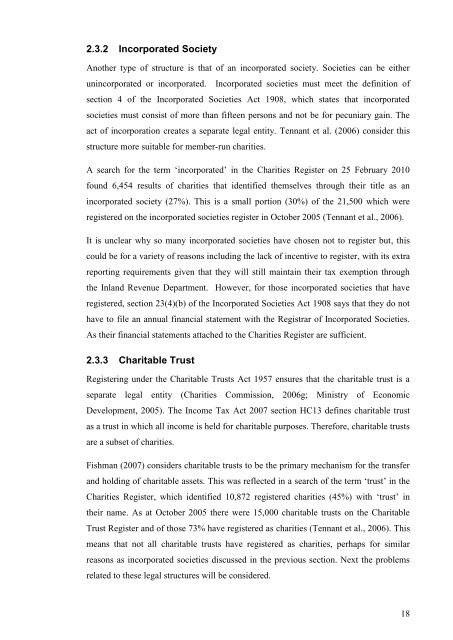Understandability and Transparency of the Financial Statements of ...
Understandability and Transparency of the Financial Statements of ...
Understandability and Transparency of the Financial Statements of ...
You also want an ePaper? Increase the reach of your titles
YUMPU automatically turns print PDFs into web optimized ePapers that Google loves.
2.3.2 Incorporated Society<br />
Ano<strong>the</strong>r type <strong>of</strong> structure is that <strong>of</strong> an incorporated society. Societies can be ei<strong>the</strong>r<br />
unincorporated or incorporated. Incorporated societies must meet <strong>the</strong> definition <strong>of</strong><br />
section 4 <strong>of</strong> <strong>the</strong> Incorporated Societies Act 1908, which states that incorporated<br />
societies must consist <strong>of</strong> more than fifteen persons <strong>and</strong> not be for pecuniary gain. The<br />
act <strong>of</strong> incorporation creates a separate legal entity. Tennant et al. (2006) consider this<br />
structure more suitable for member-run charities.<br />
A search for <strong>the</strong> term „incorporated‟ in <strong>the</strong> Charities Register on 25 February 2010<br />
found 6,454 results <strong>of</strong> charities that identified <strong>the</strong>mselves through <strong>the</strong>ir title as an<br />
incorporated society (27%). This is a small portion (30%) <strong>of</strong> <strong>the</strong> 21,500 which were<br />
registered on <strong>the</strong> incorporated societies register in October 2005 (Tennant et al., 2006).<br />
It is unclear why so many incorporated societies have chosen not to register but, this<br />
could be for a variety <strong>of</strong> reasons including <strong>the</strong> lack <strong>of</strong> incentive to register, with its extra<br />
reporting requirements given that <strong>the</strong>y will still maintain <strong>the</strong>ir tax exemption through<br />
<strong>the</strong> Inl<strong>and</strong> Revenue Department. However, for those incorporated societies that have<br />
registered, section 23(4)(b) <strong>of</strong> <strong>the</strong> Incorporated Societies Act 1908 says that <strong>the</strong>y do not<br />
have to file an annual financial statement with <strong>the</strong> Registrar <strong>of</strong> Incorporated Societies.<br />
As <strong>the</strong>ir financial statements attached to <strong>the</strong> Charities Register are sufficient.<br />
2.3.3 Charitable Trust<br />
Registering under <strong>the</strong> Charitable Trusts Act 1957 ensures that <strong>the</strong> charitable trust is a<br />
separate legal entity (Charities Commission, 2006g; Ministry <strong>of</strong> Economic<br />
Development, 2005). The Income Tax Act 2007 section HC13 defines charitable trust<br />
as a trust in which all income is held for charitable purposes. Therefore, charitable trusts<br />
are a subset <strong>of</strong> charities.<br />
Fishman (2007) considers charitable trusts to be <strong>the</strong> primary mechanism for <strong>the</strong> transfer<br />
<strong>and</strong> holding <strong>of</strong> charitable assets. This was reflected in a search <strong>of</strong> <strong>the</strong> term „trust‟ in <strong>the</strong><br />
Charities Register, which identified 10,872 registered charities (45%) with „trust‟ in<br />
<strong>the</strong>ir name. As at October 2005 <strong>the</strong>re were 15,000 charitable trusts on <strong>the</strong> Charitable<br />
Trust Register <strong>and</strong> <strong>of</strong> those 73% have registered as charities (Tennant et al., 2006). This<br />
means that not all charitable trusts have registered as charities, perhaps for similar<br />
reasons as incorporated societies discussed in <strong>the</strong> previous section. Next <strong>the</strong> problems<br />
related to <strong>the</strong>se legal structures will be considered.<br />
18

















